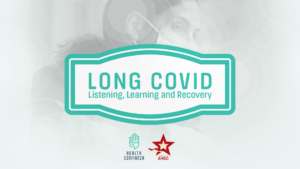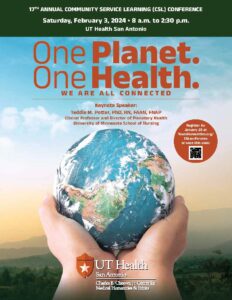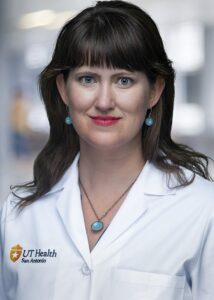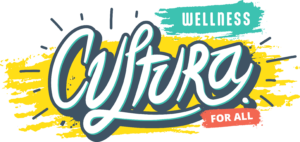A collection of stories about finding preventive health knowledge, collective wisdom and social connection at Community Health Clubs in San Antonio.
San Antonio — On a weekday morning a group of women from Harlandale, an economically-disadvantaged community on the Westside of San Antonio, were raising their heartbeats while dancing Zumba to Latin music.
Harlandale ISD Care Center, a community center that offers programs and services to promote the well-being of students and families in Harlandale, offers Zumba classes once a month. After the music stopped, a few of the class participants quickly arranged tables and chairs and the room transformed back into a community space. It was now time for a Community Health Club and a discussion on mental health.
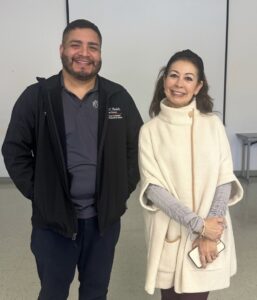
Tony Martinez and Gracie De Leon, Community Health Workers and senior community outreach specialists with Health Confianza, arrived ready to facilitate an hour-long bilingual discussion on mental health with the small group of women. Most are mothers with children in Harlandale ISD, some only spoke Spanish.
Martinez stood at the front of the room and began to ask questions. What is mental health? What’s the difference between having a bad day and depression? Martinez, who by his own admission speaks Spanglish, relied on the native speakers to translate certain words.
Slowly a conversation in two languages began.
First, the words came slowly and quietly, then the women began to share life experiences. Several mothers recalled not knowing how to deal with their teenager when they were showing signs of depression or self-harm. Another spoke about a distant relationship with a parent and coming to terms with the loss.
At the end of the hour, the women not only learned about mental health, but they also learned a little more about each other.
This is what Health Confianza’s Community Health Club model is about — it is a peer-to-peer format that brings people together to learn about health, share knowledge and help one another when they are able, motivating changes in behavior to improve health and wellness.
Jason Rosenfeld, DrPH, MPH, CHW-I, an assistant professor, director of global health with the Charles E. Cheever Center for Medical Humanities & Ethics and co-director of Health Confianza, first began using the club model during his work in remote villages in Africa. About seven years ago, Rosenfeld started the clubs in Brownsville where there are now six that have been running continuously. In 2021, at the start of the pandemic, Health Confianza received federal funding to roll out health literacy programming, including Community Health Clubs. Today, there are about 25 clubs operating around the city in underserved neighborhoods. Club members face multiple barriers to health care including lack of financial resources, health insurance, transportation and literacy skills.
Most of the clubs are led by Community Health Workers who work for Health Confianza, the City of San Antonio’s Metropolitan Health District, or local nonprofits. Health Confianza has also trained “natural leaders,” people who have a connection to the community through advocacy and or volunteer work.
“What we love about seeing the Community Health Club model evolve in San Antonio is that each community will make it its own, give it its own identity,” Rosenfeld said. “It can be a partner club, but most clubs are on top of existing programming to strengthen and sustain that effort, while some are formed from scratch to address community priorities. We are seeing that happen at community centers, schools and apartment complexes.”
Tight-knit Community
The mental health discussion at Harlandale was the community’s idea, said Maria Ayon, the Family Engagement Facilitator at Harlandale/Sosa Community Center.
“We have had groups as large as 15 come to Health Confianza’s club meetings. If they need help, this connects them to help. It is a spider web of connection,” Ayon said, adding that the friendship and support extends beyond the club.
The center has a separate Whatsapp group that they use to support each other with resources. Health Confianza’s Community Health Workers often provide links to digital resources that are shared through this group.
“Last week, they were asking how they can get some water. One person said they could drive them to the food pantry, and then a third person said they could carpool with each other,” Ayon said, adding that they help each other with everything from job hunting to immigration questions.
“This community is like a big family. They take pride in Harlandale, in their group and their work. They are a very close-knit community,” she added.
Rosenfeld said he knew that club format is effective at sharing community wisdom and changing behaviors for better health after seeing successes in Africa, the Caribbean and South Texas. But in the last few years he noticed the importance of the social connections developing within the clubs.
“The ideas of bonding and bridging and linking social capital,” Rosenfeld said. “I think it is about gaining a new social network or reinforcing existing ties. It really is about who we know and how we know them and what we gain from those relationships, recognizing that those relationships influence and strengthen our lives.”
Navigating a new country, and a new health system
On a chilly weekday morning in December, Health Confianza’s Community Outreach Specialist Gracie De Leon met with Christina Elsaaidi at the Ferrari Adult Education Center, which is part of the North East Independent School District, to check in on Elsaaidi’s Community Health Club.
De Leon acts as a club mentor to Elsaaidi whose club is under a year old.
As a program evaluator and epidemiologist for the City of San Antonio Metropolitan Health District, Elsaaidi works in the health field, but she considers the Community Health Club she leads a passion project.
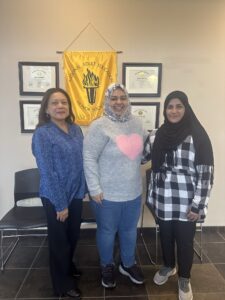
“When I first was introduced to this Community Health Club concept, I immediately thought of this place (the Ferrari Adult Education Center) because there are a lot of different backgrounds, people who are having a lot of issues with access to health information and access to health care in general,” Elsaaidi said, adding that when she first arrived to the U.S., she attended the center, which offers English as a Second Language courses, high school equivalency classes and career training.
The process of recruiting for a Community Health Club took some time, Elsaaidi said. She started with presentations during other programming, introducing the club and its purpose. When she got enough interest, she began a Whatsapp group and a weekly meeting. Today her club is a mix of newly arrived migrants from Afghanistan, Saudi Arabia and other parts of Asia and the Middle East.
Elsaaidi said the Community Health Club training gave her the tools to start the club.
“I like the curriculum part because it gave me the structure. I’ve said this before, I had the passion but I needed the structure,” Elsaaidi said.
Many of the club’s members are learning English as a second language. The most common languages spoken by members are Farsi and Pashtu, but there are also members who speak Arabic and Thai.
At first, she worried that because of language barriers, it would take longer to go over curriculum. Instead, it gave Elsaaidi an opportunity to adjust how she delivers curriculum.
“We might divide one topic into three sessions, but my point is not about finishing (the curriculum), my point is people will get what we are talking about and get it very well,” she said.
De Leon added that the club members were not only encouraging each other to expand their English vocabulary, they were learning important health terminology at the same time.
“Sometimes we don’t learn that vocabulary until we have an emergency,” De Leon said. “Christina met the needs of the members.”
Elsaaidi knows the difference the clubs can make for its members. She seen a transformation in Nafisa Noorarifi, who was a midwife in her home country of Afghanistan. Noorarifi’s expressed an interest in exercise and went from walking 10 minutes to two hours.
“I promised myself I would walk, and every day that I do, I feel fresh and happy,” Noorarifi said.
Next, Noorarifi wanted to take an English as a Second Language course to help her establish her career as a midwife in the United States. Elsaaidi, who she now considers a friend, connected her to Alamo Community Colleges, and representatives were able to enroll her in a free ESL course.
Elsaaidi is quick to distinguish her role as a club facilitator from social work.
“I want to utilize the mental health training to support each other, to build connections,” Elsaaidi said. “Today the club may ask each other, ok, ‘Today, what is your struggle? What is it that does not help you to start your life here?’ And then they will all share and maybe someone will use that information. On the back end, I will utilize the resources that I know about. I don’t want to be a case manager; I want to be a connector.”
What surprised Elsaaidi most is that club members were interested in establishing social capital, which is a set of shared values or resources that allows individuals to work together in a group to effectively achieve a common purpose.
“When I came here, I thought that those people have their communities already,” she said, adding that she learned that there was a deeper longing for social connection.
“Actually, all of them expressed loneliness. We could build that trust after they shared that with me, and we started to build our unique social capital. People are coming from different countries, different background, different cultures, but we trust each other.”
It also inspired her to want to share Health Confianza’s mental health curriculum while also talking about what they need to get their life in the United States started. The club is typically guided by an 8-week Health Confianza curriculum on different topics including mental health, Covid-19 and nutrition.
“What connects us here is that there’s always somebody who cares about them,” she said. “They know that when they come to me that I care. And that is what connected us and what keeps them committed to the club,” she said.
When Building Trust is a Lesson in Patience and Persistence
Building trust doesn’t happen overnight, especially in underserved neighborhoods that experience greater levels of crime, poverty and unemployment.
Just ask Santos Barrientes, a Community Health Worker and senior community outreach specialist with Health Confianza, who is from the Westside of San Antonio, a majority Hispanic and low-income neighborhood.
“I think it’s hard on the Westside and Southside of San Antonio. They see people (from nonprofits or universities) come in and meet their goals and then they’re out. There is no lasting impact,” he said. “Having us come in every week and having us bring different programming shows them that we are invested. I tell people that I grew up on this side of town, just down the street. I tell them that I know their struggles, I’ve seen my mom go through it and my grandparents and I can relate to them.”
For a year, Barrientes has facilitated a Community Health Club at the nonprofit Madonna Center, which offers programming for anywhere from 20 to 60 seniors who live in a 3-mile radius of the center on the Westside of San Antonio. Barrientes co-facilitates the club at Madonna Center with Alexis Whitt, a Community Health Worker with the City of San Antonio Metropolitan Health District’s Healthy Neighborhoods.
When they first started the club in early 2023, Whitt and Barrientes offered the topic of mental health, but the seniors were more interested in physical activity and nutrition. After a year of building trust, they decided to introduce the topic to see how the club would react.
To their delight, the seniors were receptive to the topic, even sharing individual experiences of loneliness and mental health issues, as well as how they coped.
On the first day of the mental health curriculum, Barrientes asked the group if they know what stigma is, and Whitt gave the definition, “the prejudices that society puts on certain conditions or attributes that make them seem different.”
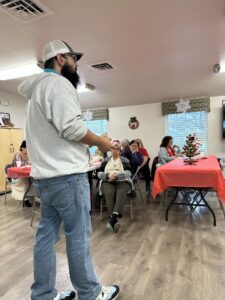
For example, Barrientes said, “men were always told you can’t have your emotions, you can’t show your emotions, man up and take care of it, and if you do share then it means your weak, not a man.”
After the meeting, one of the older men in the group pulled Barrientes aside and privately said he needed to talk to someone.
Barrientes understood the man did not have the financial resources or transportation to go to a counselor or therapist. Through his own professional network, Barrientes connected with a licensed professional counselor (LPC) who agreed to visit the center twice a month.
“The LPC has only gone once so far, but it’s been a hit with the seniors,” Barrientes said.
Barrientes said that although they did not set out to make that connection, it felt right to meet their needs.
“You are helping more than what they expected you to do. What we say in our training is just listen to the community,” Barrientes said, adding the Madonna Center is a “little more personal for me because I grew up there. It feels good to be able to change things and make them a little better.”

